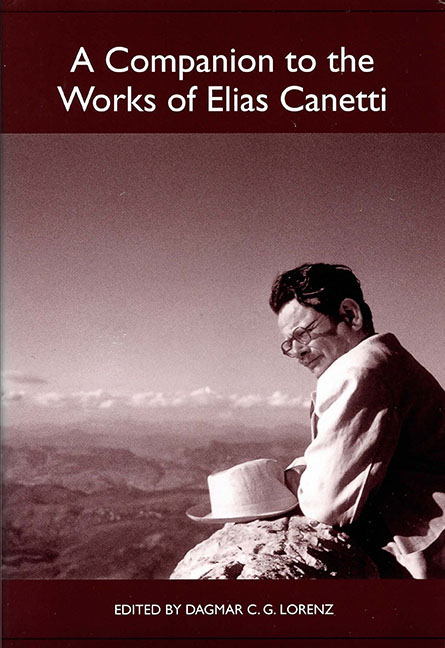Book contents
- Frontmatter
- Dedication
- Contents
- Canetti's Principal Works
- Abbreviations of Works Frequently Cited
- Introduction
- Canetti's Global Significance
- Writing and Language
- The Works: Themes and Genres
- “The Faultiest Expressions Have the Greatest Attraction”: Elias Canetti's Proverbial Aphorisms
- Canetti's Aufzeichnungen
- Staging a Critique of Modernism: Elias Canetti's Plays
- “Gute Reisende sind herzlos”: Canetti in Marrakesh
- Space in Elias Canetti's Autobiographical Trilogy
- Philosophy and Social Thought
- Historical Contexts
- Works Cited
- Notes on the Contributors
- Index
Staging a Critique of Modernism: Elias Canetti's Plays
from The Works: Themes and Genres
Published online by Cambridge University Press: 28 April 2017
- Frontmatter
- Dedication
- Contents
- Canetti's Principal Works
- Abbreviations of Works Frequently Cited
- Introduction
- Canetti's Global Significance
- Writing and Language
- The Works: Themes and Genres
- “The Faultiest Expressions Have the Greatest Attraction”: Elias Canetti's Proverbial Aphorisms
- Canetti's Aufzeichnungen
- Staging a Critique of Modernism: Elias Canetti's Plays
- “Gute Reisende sind herzlos”: Canetti in Marrakesh
- Space in Elias Canetti's Autobiographical Trilogy
- Philosophy and Social Thought
- Historical Contexts
- Works Cited
- Notes on the Contributors
- Index
Summary
The Making and Reception of the Plays
THE RECEPTION OF CANETTI's DRAMATIC WORK, which includes three plays, has been uneven. Due to an initial hesitation by the author to publish his dramas, a lack of interest from theaters, and the banning of his writings in Germany and Austria during the Nazi period, the plays did not reach the stage until long after completion. For years after writing the plays, only a small circle of people could enjoy them, through the readings that Canetti held either for friends or small audiences. The initial theatrical performances of his first two plays took place in 1965, more than thirty years after their creation in 1932 and 1934 respectively: Hochzeit (published 1964) and Komödie der Eitelkeit (published 1934). His last play, Die Befristeten, written in 1952 (published 1964), premiered in 1967 in Germany. However, Canetti's plays had little impact on the theater, and their productions were short-lived. The theater director Hans Hollmann calls Canetti's plays “Wortdramen,” word-plays. In his opinion they could only work with naturalist scenery or in a space implying irony and denunciation. Each unnecessary item on stage would diminish the text and prevent the effect of the cascade of words.
On stage the plays were rarely a success. Also as texts Canetti scholars found them less satisfying than the rest of his works. The critic Dagmar Barnouw even considers the plays outdated. She argues that they do not focus on the inner complexities of their time. Despite intriguing Grundeinfälle and occasional brilliant articulations, the plays only seem to touch on important issues. From Barnouw's present point of view at the end of the turn of the millenium the texts appear curiously innocent of the dynamics of the period in which they were written. Richard Lawson finds fault in the cerebral quality of the plays. Such criticism seems narrow, since the plays are of a special intricacy and are actually more responsive to the complexity of their time than other more frequently performed plays. Instead of focusing on issues that are passé, as Barnouw claims, they uncannily foreshadow future attitudes, injustices, and violence in late twentieth-century and early twenty-first century society.
- Type
- Chapter
- Information
- A Companion to the Works of Elias Canetti , pp. 137 - 156Publisher: Boydell & BrewerPrint publication year: 2004



